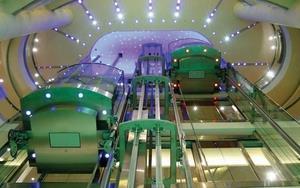A new ŌĆśacademyŌĆÖ for lift apprentices aims to teach them that there is something to be learnt from every job
An engineer with no curiosity is no engineer at all. But give them the chance to be curious, especially at apprenticeship level, and theyŌĆÖll develop into much better engineers. ThatŌĆÖs the theory behind the Lift Academy, started by David Cooper, managing director of consulting engineer LECS, which specialises in lifts, escalators and facade access equipment.
The academy takes lift apprentices aged 16 to 23 and puts them through seminars that teach them to question why they do the tasks that they are assigned.
ŌĆ£These are pretty basic stuff: this is a rope and how to choose the correct one,ŌĆØ says Cooper, former chairman of the CIBSE lift group. ŌĆ£But it also teaches them to ask why that particular one was chosen and to analyse; to ask why that particular rope may be frayed, rather than just change it. They should know, for instance, that a 7in diverter wheel may not be the correct wheel to install even though that was the one given to them.ŌĆØ
Cooper quickly points out that the Lift Academy is not a replacement for NVQs. It offers no qualifications. Also, it is not a top-down managerial answer to any problem. He came up with the idea after an apprentice asked him why he was travelling around talking about apprenticeships to managers and not spending time talking to apprentices. The question caught him by surprise: ŌĆ£There was a pained silence and then I realised that he was right. When I do a talk, the room is generally full of industry managers.ŌĆØ
His answer was to create the academy, which is unlike normal learning centres as it has no office or staff it is not about fees and payments. There is no charge to attend the seminars, which usually last about two hours.
The only cost for an apprenticeŌĆÖs firm is transport to the event, usually held at another firmŌĆÖs premises. Speakers give their time free. Cooper takes no money for his organisational efforts; itŌĆÖs all part of his passion for education.
He started his career in 1980 as an outdoor machinery apprentice with British Rail, working on cranes and lifts. He studied at BTEC and HNC level before gaining a BSc in engineering and management from the Open University. He is now working on a research degree at Northampton University, looking into incidents involving falls from or over the sides of escalators.
The academyŌĆÖs first seminar, in London in November, was attended by 85 apprentices. Other seminars have been held in London and Manchester, attracting about 90 attendees. So far large firms such as Otis, Schindler and Thyssen have been absent, Cooper says. ItŌĆÖs been the small to medium size firms sending apprentices, in groups of five or so. That makes about 16 firms represented at each seminar. ŌĆ£So the interest is there,ŌĆØ he says. ŌĆ£But I want this to be open to everybody.ŌĆØ
More seminars are planned; about one every three months in any given area. Cooper does not want the academy to be London-centric and is keen to hear from interested firms as far afield as possible, including Scotland and Northern Ireland.
Topics such as gears, locks, buffers and handling systems have already been scheduled and speakers lined up for the whole of this year. But Cooper urges the sector to tell him what it needs, so that he can then set it up. ŌĆ£There is no point in us standing around wondering what the government can do for us. WeŌĆÖve got to act for ourselves.ŌĆØ
For more information, write to david.cooper@lecs.co.uk
Source
║┌Č┤╔ńŪ° Sustainable Design





















No comments yet